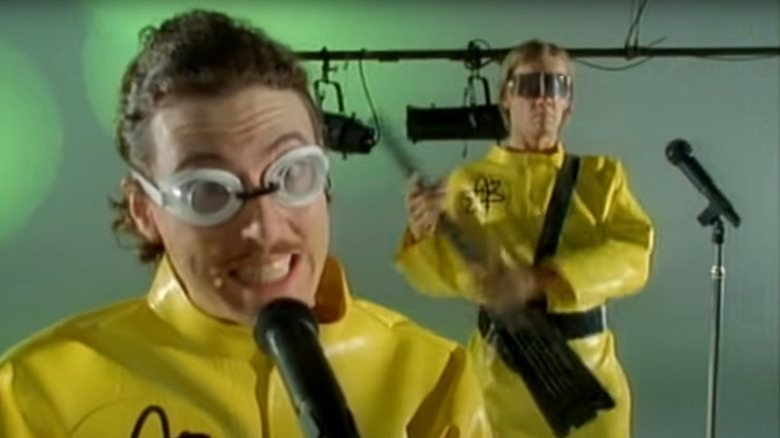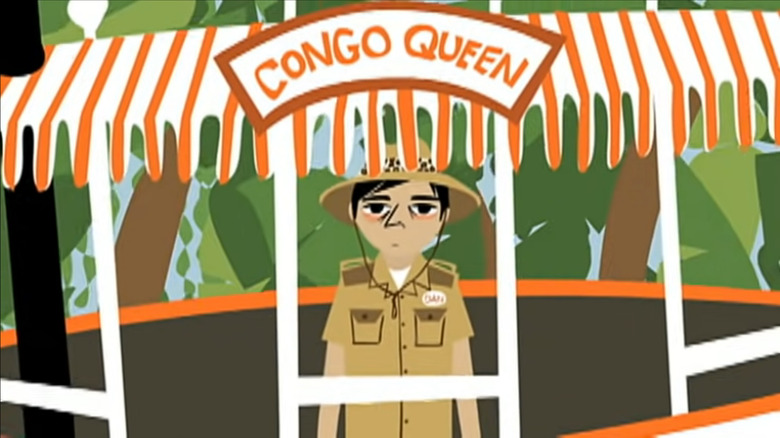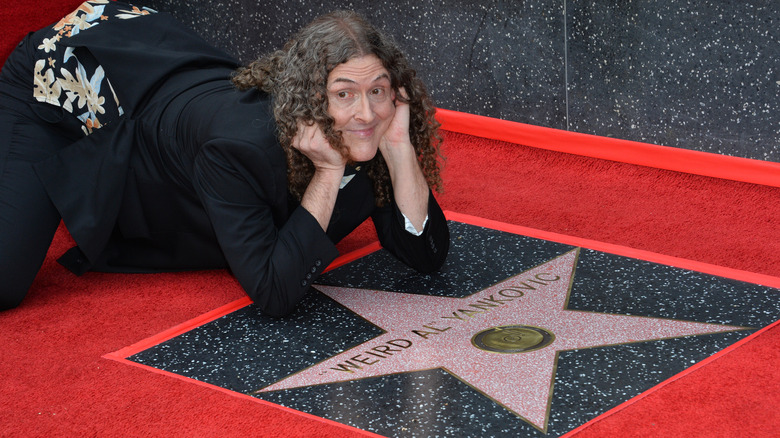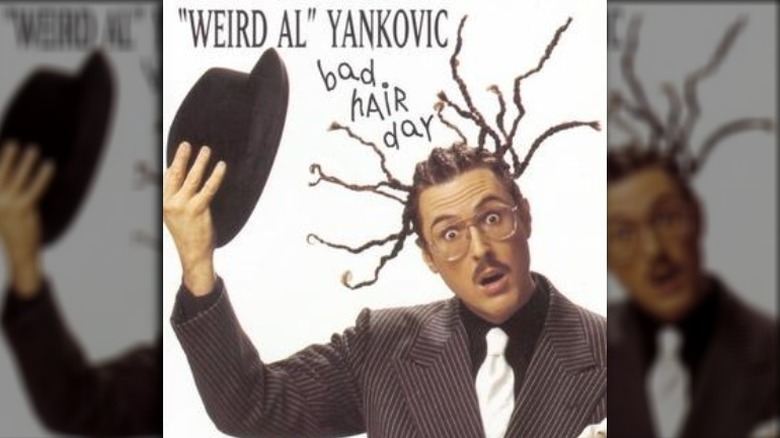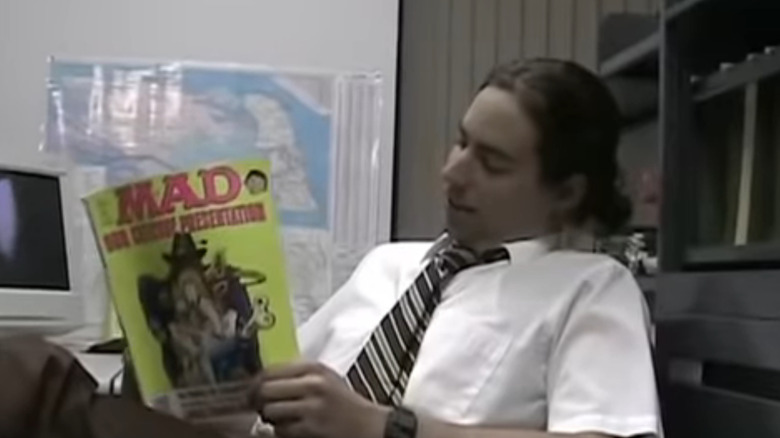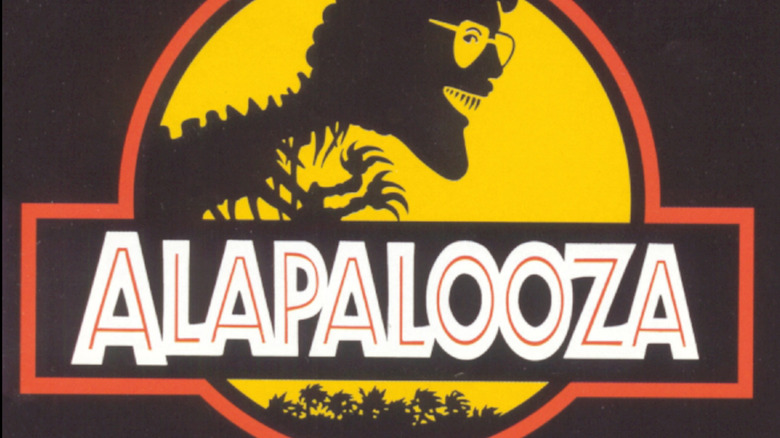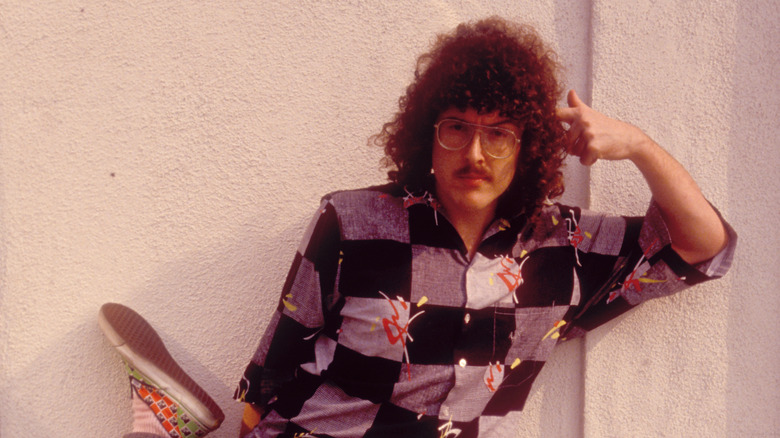Weird Al's Best Non-Parody Songs
Parody is one of the easiest comedy forms to engage in, but one of the most difficult to excel in. Pop culture parodies tend to be extremely immediate and extremely short-lived — as soon as the trend or fad fades away, so does any interest in the parody. That also means parody often has an extremely short shelf life. As the years go by, younger generations may puzzle over the references or simply not bother to do that work.
That level of difficulty makes the achievements of "Weird Al" Yankovic unique and impressive. Since the first time his music was heard on the radio in 1976, (via the LA Times) Yankovic has become an unlikely but treasured pop culture icon. Along the way he's become that greatest of rarities: a pop-culture parodist with staying power.
What some people may forget is that crafting a pitch-perfect song parody takes a lot of musical talent. What people also often forget is that the first Yankovic jam on the radio in 1976 was not a parody — it was an original called "Belvedere Cruising." There's no better proof of Yankovic's musical powers than his non-parody work. Yankovic includes originals on just about every one of his albums, and while they typically mimic a particular style or genre, they're not parodies — they're just funny songs. Here's a deep dive into "Weird Al"'s best non-parody songs.
One More Minute
A perfect approximation of 1950s R&B with a spice of Elvis Presley, "One More Minute" is a master class in comedic slow burn. The song starts off conventionally, with "Weird Al" Yankovic bemoaning the fact that his lover is leaving him. So far, so normal. Slowly, though, the song gets angry — and hilarious — as Yankovic details all the things he'd prefer to do than spend even a single minute longer with his ex. Highlights include "I'd rather spend eternity eating shards of broken glass / Than spend one more minute with you" and "I'd rather clean all the bathrooms In Grand Central Station with my tongue / Than spend one more minute with you."
The song is one of Yankovic's most popular non-parody works because it simultaneously subverts expectations of the genre and subject matter while expressing an emotion everyone has felt after a bad breakup. As Geek News Network notes, the lyrics are timeless. And Rolling Stone points out that the angry tone of the song led to a very rare PG-13 moment from Yankovic, who includes a sly reference to self-love with the lyric "I'm stranded all alone in the gas station of love / And I have to use the self-service pumps."
According Rock Cellar Magazine, the song's evergreen appeal was underscored when Yankovic appeared on "The Tonight Show Starring Jimmy Fallon" in March 2020 to sing it as "the perfect social distancing anthem."
Dare To Be Stupid
There's absolutely no doubt that "Dare To Be Stupid" is intended to be a Devo sound-alike, but it's not a parody so much as a surprisingly thoughtful riff on modern life and Devo's place in an increasingly disposable pop-culture. The AV Club puts it perfectly, saying "[Devo] spent the better part of two decades satirizing humanity's scramble to be stupider than its predecessors. 'Weird Al' manages that trick in three minutes and 33 seconds and manages to make the act of co-opting ad copy for song lyrics sound totally organic."
Music critic Nathan Rabin notes that "Dare To Be Stupid" exemplifies Yankovic's ability to infuse real, potent social commentary into his songs without sacrificing their earworm status or humor. The song manages to sound just like Devo without actually parodying any specific song, and the lyrics comment on an aspect of American culture — its strong and worrying anti-intellectualism — with something you wouldn't expect from someone whose most famous song probably remains "Eat It." It's thoughtful wit.
Most importantly, as noted by Rabin, the song is "a banger." You could slide this song into any 1980s playlist and no one would bat an eye. In fact, people would probably dance to it.
The Biggest Ball of Twine in Minnesota
One of the best aspects of "Weird Al"'s songwriting persona is how relatable he is. Yankovic's songs — both his parodies and his originals — zero in on the things that bind us together as humans, whether it's the inability to understand a song's lyrics, our most deeply-buried nerdiness, or — stay with me here — the impact of chronic pain.
Take "The Biggest Ball of Twine in Minnesota," which closes out the "UHF" soundtrack album. Composed and performed in the style of singer-songwriters like Harry Chapin or Gordon Lightfoot, the song centers in on a common experience: a road trip to an underwhelming yet somehow entertaining tourist trap in the middle of America. The AV Club describes the song as celebrating the "delightful symptoms of road-trip-induced dementia."
As music critic Nathan Rabin points out, the song's humor stems from its serious-as-a-heart-attack tone. The character in the song treats this kitschy roadside attraction with the reverence these sorts of songs usually pin on true love or a slightly deeper concept. The song's lyrics don't just masterfully create a funny situation, they sketch out fully-fleshed characters and a local universe. You almost feel like you've actually visited Darwin, Minnesota (where the twine ball actually exists).
Skipper Dan
One of the defining characteristics of "Weird Al" Yankovic's remarkable career is his ability to change with the times. Music shifts and evolves, and Yankovic keeps pace, working in rock, hip-hop, blues, and, yes, polka. So it's no surprise that he eventually got around to writing an original song that is such a perfect Weezer riff it might as well be a Weezer song: "Skipper Dan."
Wired explains that the song tells a heartbreaking and relatable story about a passionate kid who works really, really hard to become an actor and winds up working at a theme park, running jungle cruise rides in the role of Skipper Dan.
Everyone has experienced career frustration and failure. Modern Western culture tends to focus on the movie stars who make success seem easy and assured — all you have to do is do the work! But Yankovic's lyrics get to the lie: "Hit the boards and paid my dues / And got phenomenal rave reviews" he sings, "But the years have come and gone / And I'm sorry to say that's not the way that it's all worked out."
Nathan Rabin notes that part of the song's appeal, aside from how catchy it is, is he note of hope and resilience Yankovic injects into the depressing topic. It's more subtle and deeper than most of Yankovic's tunes.
Everything You Know is Wrong
"Weird" Al may be one of the most brilliant musicians to have ever lived. The way he pivots from musical style to musical style — often approximating the sound of other artists so perfectly his work could be mistaken for them — is nothing short of astounding. For example, you don't have to be a huge They Might Be Giants fan to appreciate how pitch-perfect "Everything You Know is Wrong" turned out.
As noted by music critic Nathan Rabin, what makes this particular song so head-spinning is the fact that They Might Be Giants, while not a parody band, are known for their humorous and absurdist songs. So you have a brilliant comedic mind writing an homage to other brilliant comedic minds, and the result is fantastic. Billboard included it on its 2014 list of Yankovic's funniest songs, and ParentCo. lists it as one of seven "Weird Al" songs that are "secretly about parenting," saying that it approximates the experience of "apologizing to a furious four-year-old that all the rocket crackers are gone because he ate them."
The true joy of the song is how Yankovic just goes for it lyrically. Stuff like "Just then the floating disembodied head of Colonel Sanders started yelling / Everything you know is wrong" and "I was walking to the kitchen for some Golden Grahams / When I accidentally stepped into an alternate dimension" are just flat-out hilarious.
You Don't Love Me Anymore
To appreciate what "Weird Al" Yankovic is doing here it helps to remember there was once a band called Extreme who had a mega-hit with the ballad "More Than Words," and that they made an uber-serious video to promote it. But perhaps it's not necessary, because "You Don't Love Me Anymore" is simply a great song on its own.
As noted by Yahoo! News (which considers it to be "probably the best original song in his entire discography"), the song employs the classic Yankovic strategy of starting off sincerely and then slowly ramping up the absurdity. Through it all, he maintains a deadpan, serious tone that belies the insanity of a relationship gone way off the deep end.
The AV Club reports that Yankovic liked the song so much that after the surprise success of "Smells Like Nirvana" he fought to have it released as the second single from the album. The label was reluctant to release an original, so he had to agree to make the video a parody in order to get the song out there. And thank goodness he did, or we might not know about lyrics like "You know, I even think it's kinda cute the way / You poison my coffee just a little each day."
Dog Eat Dog
Like many of "Weird Al" Yankovic's original songs, "Dog Eat Dog" pivots off the trademark sound of a specific group — in this case, Talking Heads. As the AV Club discusses, the genius of the song is that it isn't a parody. What Yankovic does in many of these homage songs is deconstruct a band or artist's musical DNA and then put the pieces back together in a wholly original package. The result is a song that's as much a celebration of everything that makes Talking Heads special without actually copying or even directly riffing off any specific song — right down to the signature way David Byrne writes loopy lyrics about mundane, everyday things.
One aspect of parody that lesser talents get wrong is that successful parody starts with love. In order to make fun of something, you have to be intimately familiar with it and why it works in the first place. "Weird Al: The Book" makes the point that the reason these original "style parodies" work is because Yankovic has real affection and appreciation for the music he's mimicking — he loves Talking Heads, and this song oddly proves it. The AV Club explains that the song doesn't rely on a cheap pun or a single moment in pop culture, and that this increases the chances that people will appreciate it for what it is: a great song that happens to sound like a specific band.
Albuquerque
One sign of a true musical legend is that one song that the fans always scream for, that one signature song that separates the casuals from the true fans. For "Weird Al" Yankovic, that song is "Albuquerque."
It's epic — more than 11 minutes long and jammed full of lyrics (at nearly 2,000 words it's basically a short story). Consequence of Sound considers "Albuquerque" to be Yankovic's best original, calling it "strange and singular." Vaguely in the style of George Thorogood or the Rugburns, it's a hard-charging rocker that tells a crazy, stream-of-consciousness story. As music critic Nathan Rabin explains, the song is a meta-joke on the very concept of "story songs." Yankovic rambles his way through the tale of a man who wins a ticket to Albuquerque and starts a new life there. It's absolutely insane, but the energy level is off the charts and it's catchy as heck, too.
In the end, the song's ability to keep the listener engaged in its story is a testament to Yankovic's incredibly songwriting skills. Entertainment Weekly reports that Yankovic didn't have high hopes for an 11-minute original, but his fans love the song — they even voted it his third-best song in a Rolling Stone readers' poll.
Frank's 2000-Inch TV
Reminiscent of R.E.M. and a certain period of 1980s college rock, this original isn't a specific "style parody" so much as a general genre homage. And it absolutely nails the sound and vibe in a way only a skilled musician could manage.
As Nathan Rabin notes, the song isn't Yankovic's funniest, but the absurdity of a neighbor having an absolutely enormous television in their backyard is funny enough. Yankovic not only builds an extremely catchy and well-crafted song from this concept, he also affectionately nails modern society's obsession with television not just as a source of entertainment but as a status symbol.
Geek News Network explains that one aspect of the song that sets it apart is its relative lightheartedness. Many Yankovic songs are surprisingly dark in tone and subject matter, but "Frank's 2000-Inch TV" is pretty happy. No one suffers due to the incredible size of Frank's TV — in fact, everyone seems pretty excited about it, and the narrator can now watch "The Simpsons" from 30 blocks away.
I Remember Larry
"Weird Al" Yankovic's original music tends to follow a formula: Happy, pop melodies wrapped around surprisingly dark and disturbing lyrics. "I Remember Larry," in the style of 1970s/1980s New Wave music is one of the best examples. You don't get a specific band vibe here — it's just a great rock song about an old friend named Larry.
But, as noted by Geek News Network, Larry is kind of a sociopath. Yankovic seems to be fondly recalling his adventures with Larry, but those adventures are not fun: Larry makes endless prank calls, fills his toothpaste tube with glue, and cuts his hair for a laugh. No wonder the song builds to a climax where Al kidnaps Larry and ... puts an end to his pranks for good.
Part of the secret of Yankovic's success is his musicianship — he's never coasted on a silly idea or easy parody concept. As music critic Nathan Rabin notes, the music here is surprisingly complex, with layers of harmonies and dense guitar work. On top of that, the humor of the song comes from a relatable place. We've all had a Larry in our lives, a person who masks passive-aggression in humor and "harmless" pranks we're not allowed to get upset about. In that sense, the song if wonderfully cathartic.
Genius in France
A musician like "Weird Al" Yankovic can only create his spot-on parodies and stylistic tour-de-forces because he loves music — all kinds of music. Yankovic can convincingly swerve from polka to punk to pop and not miss a beat. There's no other musician in the world who could pull off a Frank Zappa homage like "Genius in France."
In fact, this song is so Zappa you'd be forgiven for thinking it was Frank Zappa. Music critic Nathan Rabin reports that Zappa's son Dweezil plays the guitar solo on the track so the Zappa family must have approved of Yankovic's love letter to Frank. And the song once again displays Yankovic's deceptive smarts. "Weird Al: Seriously" argues that Yankovic manages to layer his self-deprecating humor (the song's basically about how stupid he is) inside a meta-joke about how the French have bizarre and arguably stupid cultural taste.
Rabin praises the song's complexity, likening it to a "a suite that combines an entire album worth of ideas, ambition and genres into a nearly nine minute epic." Sure, it's clearly inspired by Zappa's own jazzy, complex works, but it's still an incredible musical achievement. Plus, where else are you gonna here a lyric like "Hoom chaka laka"?
Lame Claim to Fame
AZ Central ranks "Lame Claim to Fame," "Weird Al" Yankovic's southern-rock inspired banger (Laughing Squid suspects it's an ode to Southern Culture on the Skids), the best song on his 2014 album "Mandatory Fun," and it's easy to see why. The song's a straightforward rocker with an irresistible hook, and the lyrics are all about the dubious celebrity connections people try to brag on: "One time I was in the checkout line / Behind Steven Seagal / Once I'm pretty sure Mr. Jonah Hill / Was in the very next bathroom stall!"
As music critic Nathan Rabin explains, the song is not just catchy — it's smart too. Many people have been thrilled to have a celebrity encounter, or tried to name-drop a famous person in order to make themselves look important or cool. Yankovic's lyrics always pivot off of scenarios that everyone can relate to, which is part of his success.
Yankovic, who has been famous for decades, understands that we name-drop celebrity connections and encounters in order to wrap ourselves in reflected glory. But the more remote and tenuous that connection is, the less glory it conveys — until we're actually making ourselves look sad by trying to leverage it. Once again, Yankovic rings brilliant songwriting, hard work, and serious musicianship to a song that could have been a throwaway, but instead is one of his best original compositions.


